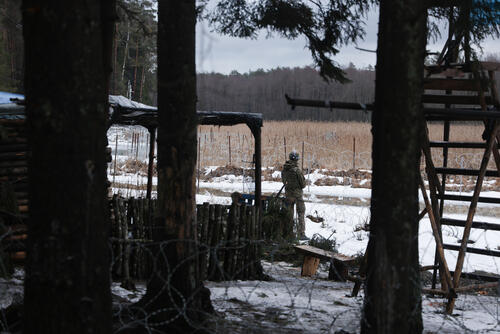Warsaw – As the Polish Senate approved today a law that excludes criminal liability of officers of the police, border guard, and soldiers of the armed forces who use coercive measures at the Polish-Belarusian border, Médecins Sans Frontières (MSF) warns of the possible dramatic consequences of the increasing militarisation of the Polish-Belarusian border and the restrictions on access to the buffer zone. These measures will lead to a further deterioration of the humanitarian situation at the border, compounded by an increased risk of normalising the use of lethal weapons and potentially dramatic consequences for those seeking protection at the border.
On 13 June, Poland reintroduced an exclusion zone covering about 60 kilometres of the country’s border with Belarus, covering key locations where migrants have been most intensely crossing the border since 2021. Media and humanitarian workers are only able to access the area after getting permission from the border guard. The restriction was set up to last 90 days.
As of 23 July, despite official requests for unrestricted and independent access to the entire border region to provide medical-humanitarian assistance, MSF had only been allowed to enter a small part of the buffer zone for a limited period of 30 days. Humanitarian workers and volunteers from other grassroot organisations, who are an integral part of humanitarian assistance at the border, have not been granted access to provide humanitarian assistance and are at increased risk of criminalisation.
We do not know what is happening in the densely forested area between Poland and Belarus. And we cannot help the people we cannot see.Andreas Spaett, head of MSF’s humanitarian activities in Poland
“The ban acts like a blindfold. We do not know what is happening in the densely forested area between Poland and Belarus. And we cannot help the people we cannot see,” says Andreas Spaett, head of MSF’s humanitarian activities in Poland. “All people seeking protection in Poland should be treated with humanity and dignity. Access should be provided to all humanitarian organisations.”
The recent developments, including the ban on entry to the border area, will have life-threatening consequences for people who are unable to obtain the necessary humanitarian and medical assistance. Without access for civil society organisations to the buffer zone, acute needs are not met.
In the first six months of 2024, MSF conducted 99 interventions in the border zone and provided urgent medical assistance to 142 people suffering from extreme exhaustion, gastrointestinal infections and injuries related to violence (including deep cuts, bruises and suspected fractures). This included referring 32 patients to hospital for general exhaustion, hypothermia, dehydration, wounds/orthopaedic conditions, worsening chronic diseases, psychological distress, and women in pregnancy. Most individuals treated by MSF report having been stranded in the forested stretch of land between the two border fences, referred to by refugees as the ‘death zone’, for an average of 21 days, and for some up to 90 days, with limited access to food or water. In this harsh context, medical problems can lead to rapid deterioration of people's health and can be life-threatening if they do not receive timely assistance and medical care.
Considering the humanitarian and medical concerns raised above, MSF calls upon the Polish authorities to fundamentally change course and take all necessary measures to ensure that individuals seeking protection in Poland are treated with humanity and dignity. This includes:
- Ensure that all people in need can access humanitarian assistance, medical care and asylum procedures;
- Safeguard independent humanitarian and civil society access to the entire border area, including buffer zone, an imperative to delivering lifesaving assistance to people in need;
- Reconsider legal amendments, which risk providing further legitimacy to the use of violent practices at the border;
- End harmful narratives around humanitarian aid activities as well as those rooted in the dehumanisation and securitisation of people seeking protection.
* Government draft 'Act amending certain acts to improve the activities of the Armed Forces of the Republic of Poland, the Police and the Border Guard in the event of a threat to state security' adopted by the Sejm.



